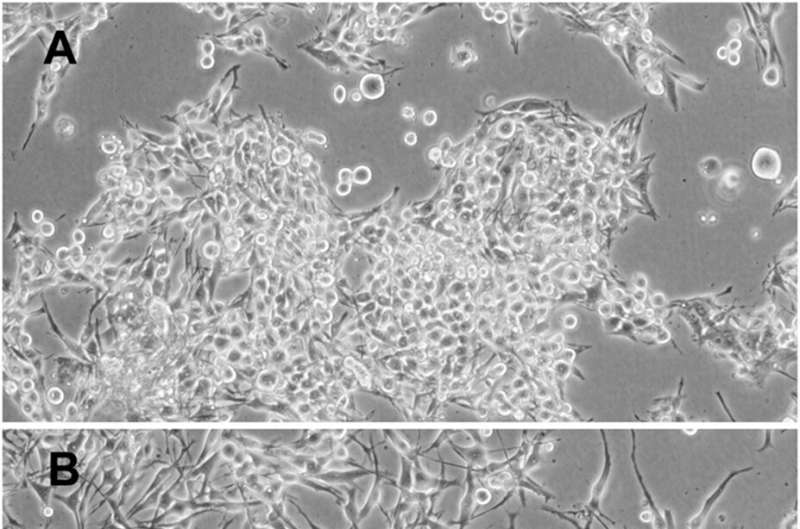This article has been reviewed according to Science X's editorial process and policies. Editors have highlighted the following attributes while ensuring the content's credibility:
fact-checked
trusted source
proofread
Hope for new therapy to stop advanced skin cancer

Researchers at St George's, University of London have discovered a technique that can kill skin cancer cells while minimizing damage to healthy cells. The findings are published in the journal Biology Open.
Melanoma skin cancer is the fifth most common cancer in the U.K. It's anticipated that the number of people with skin cancer is likely to continue to rise, with recent estimates suggesting cases will increase by 50% in the next 20 years.
Early diagnoses and treatments for skin cancer have been key to reduce the number of deaths, but it's vital that new therapies are developed to neutralize melanomas that have metastasized and spread from the skin to other parts of the body.
Targeting a 'molecular switch'
Dot Bennett, professor of cell biology at the Molecular and Clinical Sciences Research Institute, St George's, University of London, and her team worked on a protein known as p16, which acts like a "molecular switch." Normally, it causes cells to stop dividing before they grow out of control and is known for its ability to suppress tumor development. But when this switch is broken, it allows cells to grow out of control and become cancer.
The researchers made a series of changes to a small, active section of p16—called a p16-related peptide—including a change enabling it to enter cells. They added it to melanoma skin cancer cells in the laboratory to see if it would stop them from dividing. The peptide was also tested on normal skin pigment cells and other skin cells called fibroblasts.
"We tried the p16 peptide on three lines made up of metastatic melanoma cells. All of those were nicely wiped out, yet it did little harm to the normal cells, which is very promising. We were very surprised at its effectiveness and although a great deal of extra work needs to be done before we can think of using this on human patients, it is very encouraging," says Bennett.
Chief Executive of Cancer Research UK, Michelle Mitchell, said, "More people than ever are surviving melanoma skin cancer, but there remains a critical gap in survival between people diagnosed at early stages compared to those diagnosed later.
"One of the best strategies to address that gap is to find new treatments which attack cancer, while minimizing harm to healthy cells. p16-related peptide could offer a promising new approach for those patients diagnosed with metastatic disease, where options for treatment are currently more limited."
Adil Sheraz, consultant dermatologist and British Skin Foundation spokesperson added, "This research is an exciting development towards treating melanoma, the most lethal form of skin cancer. The protein p16-related peptide preferentially targets melanoma cells, preserving fibroblasts—which play a vital part in skin repair and regeneration—and causing minimal damage to other cells. While further research is needed, this has the potential for much more favorable outcomes for melanoma patients."
Further research is now needed to test the p16-related peptide on other types of healthy skin cells and to determine how the cancer-killing mechanism is triggered.
More information: Julia K. Soo et al, Preferential killing of melanoma cells by a p16-related peptide, Biology Open (2023). DOI: 10.1242/bio.059965



















